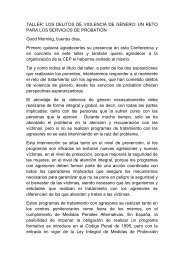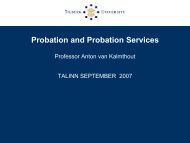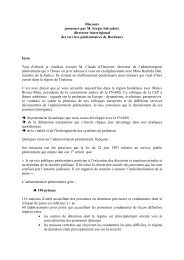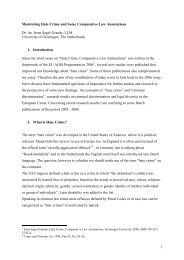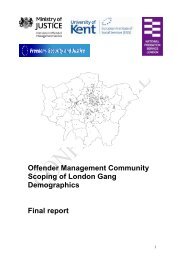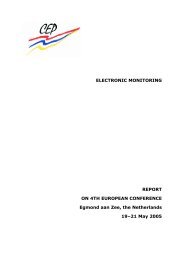Young people - the opportunities and challenges of tagging
Young people - the opportunities and challenges of tagging
Young people - the opportunities and challenges of tagging
You also want an ePaper? Increase the reach of your titles
YUMPU automatically turns print PDFs into web optimized ePapers that Google loves.
<strong>Young</strong> People – The Opportunities<br />
<strong>and</strong> Challenges <strong>of</strong> Tagging<br />
Mary Wyman, Head <strong>of</strong> programmes <strong>and</strong> innovation<br />
Sue Walker, Strategy manager, programmes <strong>and</strong> innovation
Agenda<br />
● An Overview <strong>of</strong> <strong>the</strong> Use <strong>of</strong> Tagging for Juveniles<br />
● Electronic Monitoring<br />
● ISSP – An example <strong>of</strong> how a Curfew can be used as part <strong>of</strong> a<br />
sentencing package<br />
● HMIP Inspection <strong>of</strong> Electronic Monitoring & Challenges Raised<br />
● Discussion
Curfew Order for Juveniles<br />
● Requires a young person to remain in a specified place for a set<br />
period <strong>of</strong> time<br />
● Can be used as:<br />
A community sentence in its own right<br />
Alongside o<strong>the</strong>r community sentencing options<br />
As a condition <strong>of</strong> Bail<br />
As a Licence Condition on release from custody in certain<br />
circumstances
Curfews cont …<br />
● Can be given between 2 – 12 hours per day<br />
● Can last up to 6 months<br />
● Can be electronically monitored at <strong>the</strong> request <strong>of</strong> <strong>the</strong> Court<br />
● Should be strictly enforced to National St<strong>and</strong>ards by Case<br />
Managers
Purpose<br />
● Restricts Liberty<br />
● Assists in changing behaviour – <strong>the</strong> Courts view Curfews as a<br />
valuable tool to change <strong>the</strong> behaviour <strong>of</strong> a juvenile who is out at<br />
night causing anti-social behaviour<br />
● Disrupts <strong>the</strong> <strong>of</strong>fending behaviour <strong>of</strong> prolific <strong>and</strong> persistent <strong>of</strong>fenders<br />
through strict monitoring <strong>and</strong> enforcement<br />
● Protects & reassures <strong>the</strong> community<br />
● Assists Police
Electronic Monitoring<br />
● Monitors Curfew compliance<br />
● Violations can be addressed quickly, which reinforces <strong>the</strong> message<br />
to young <strong>people</strong><br />
● Immediate response initiated with police in bail cases, helping to<br />
protect <strong>the</strong> community<br />
● Can (in some instances) work to <strong>the</strong> young persons advantage by<br />
providing an alibi – although caution must be maintained in <strong>the</strong>se<br />
cicumstances
Misconceptions<br />
● The tag provides a means <strong>of</strong> tracking <strong>the</strong> young person’s<br />
whereabouts outside <strong>of</strong> <strong>the</strong> home.<br />
● The young person can remove <strong>the</strong> tag without alerting <strong>the</strong> control<br />
centre.<br />
● Case Managers ‘let <strong>people</strong> <strong>of</strong>f’ for curfew violations<br />
● <strong>Young</strong> <strong>people</strong> like being tagged, it is a badge <strong>of</strong> honour.
ISSP– an overview<br />
● Intensive Supervision <strong>and</strong> Surveillance Programme (ISSP) is a<br />
programme designed for prolific <strong>and</strong> serious young <strong>of</strong>fenders<br />
● ISSP is a community based programme that <strong>of</strong>fers <strong>the</strong> Courts a<br />
rigorous alternative to custody as an attachment to a Community<br />
Order, or part <strong>of</strong> a Bail package<br />
● ISSP can also be a licence condition during <strong>the</strong> community part <strong>of</strong> a<br />
Detention <strong>and</strong> Training Order (DTO)
What sets ISSP apart?<br />
● 25+ hours <strong>of</strong> supervisory input per week<br />
● Minimum <strong>of</strong> 2 surveillance checks per day<br />
● Extensive use <strong>of</strong> curfews with electronic <strong>tagging</strong><br />
● Interventions tailored to <strong>the</strong> needs <strong>and</strong> lifestyles <strong>of</strong> <strong>the</strong> young <strong>people</strong><br />
● Partnership with <strong>the</strong> Operational Police Units (intelligence units) with<br />
regular meetings <strong>and</strong> daily information sharing if required.
Supervision<br />
25 hours minimum per week involving <strong>the</strong> following elements:<br />
• Education/employment/training<br />
• Offending Behaviour Programmes<br />
• Family support<br />
• Restorative Justice<br />
• Interpersonal Skills<br />
• O<strong>the</strong>r - Drugs<br />
Alcohol<br />
Health
Surveillance<br />
How does <strong>tagging</strong> help?<br />
• Creates structure in <strong>the</strong> young person’s life <strong>and</strong> <strong>the</strong>refore <strong>the</strong> young<br />
person is more likely to be able to comply with daytime requirements<br />
<strong>of</strong> <strong>the</strong> programme<br />
• Curfew can take some pressure <strong>of</strong>f parent or carer<br />
• Allows family work to take place in <strong>the</strong> home<br />
• Provides re-assurance to <strong>the</strong> community<br />
• Assists Police
General Challenges<br />
● Should young <strong>people</strong> be tagged – human rights issues<br />
● Youth Offending Team staff not always in favour <strong>of</strong> <strong>tagging</strong> – raising<br />
issues <strong>of</strong> welfare – v – punishment<br />
● <strong>Young</strong> <strong>people</strong> do not like tags<br />
● Enforcement relies on good communication between two separate<br />
agencies
HMIP Inspection - Challenges<br />
An enormous amount <strong>of</strong> effort has been put into establishing good<br />
communication between <strong>the</strong> YOT <strong>and</strong> <strong>the</strong> EM provider. It is recognised that<br />
this is essential to maintain <strong>the</strong> integrity <strong>of</strong> this community sentence.<br />
However, despite this work <strong>the</strong> Inspection found that <strong>the</strong> Electronically<br />
Monitored Cufew could be better integrated into Offender Management by:-<br />
●<br />
●<br />
●<br />
YOTs providing <strong>the</strong> EM Contractor with relevant information on vulnerability<br />
<strong>and</strong> risk <strong>of</strong> harm to o<strong>the</strong>rs<br />
YOTs routinely informing EM Contractor <strong>of</strong> decisions regarding enforcement<br />
<strong>and</strong> reasoning on rare occasions when <strong>the</strong>y decide to act against <strong>the</strong> given<br />
st<strong>and</strong>ard<br />
EM Contractors providing clear information to Offender Managers including<br />
simple summary on all cases.
Challenges – cont …<br />
● The inspection also detailed a need to develop a ‘smarter’ approach<br />
to compliance <strong>and</strong> enforcement <strong>and</strong> that this could be achieved by<br />
working to tighter <strong>and</strong> transparent boundaries, but with more<br />
discretion available in appropriate individual cases.
Discussion<br />
● How much information should be conveyed to young <strong>people</strong> about<br />
<strong>the</strong> enforcement <strong>and</strong> National St<strong>and</strong>ards related to <strong>the</strong>ir tag?<br />
● Are <strong>the</strong> National St<strong>and</strong>ards too lenient?<br />
● How much information on a young person’s circumstances should<br />
be passed to an external contractor?
Contact Details<br />
● Mary Wyman, Head <strong>of</strong> Programmes & Innovation, Youth Justice<br />
Board for Engl<strong>and</strong> & Wales, 11 Carteret Street, London, SW1H 9DL.<br />
Email: mary.wyman@yjb.gov.uk<br />
● Sue Walker, Strategy Manager, Programmes & Innovation, Youth<br />
Justice Board for Engl<strong>and</strong> & Wales, 11 Carteret Street, London,<br />
SW1H 9DL. Email: susan.walker@yjb.gov.uk<br />
● Youth Justice Board website: www.yjb.gov.uk


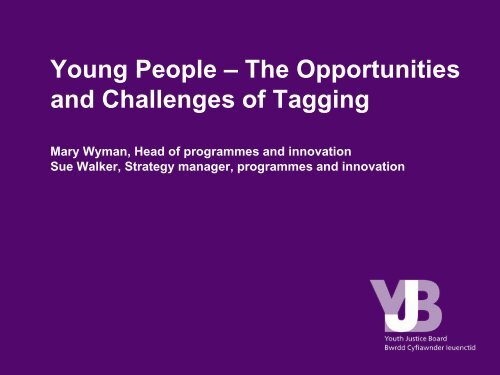

![AGIS2 Nov 08 Conference Report_[Version 2] - CEP, the European ...](https://img.yumpu.com/50764570/1/190x245/agis2-nov-08-conference-report-version-2-cep-the-european-.jpg?quality=85)

